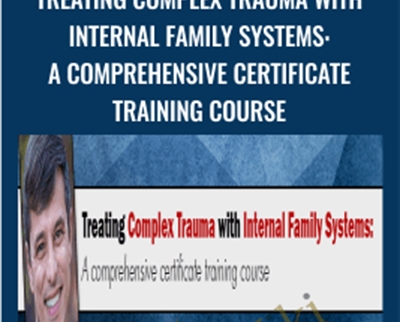Treating Complex Trauma with Internal Family Systems: A comprehensive certificate training course – Frank Guastella Anderson
$87.00
After decades of clinical breakthroughs and scientific research, the IFS model has been shown to be effective for healing even the most complex trauma. Join Dr. Frank Anderson, psychiatrist, author, and vice chair of the Foundation for Self Leadership — the leading organization dedicated to advancing the IFS model through research and training — in this comprehensive certificate course where he provides you a step–by–step guide for applying IFS into your clinical practice.
Description
Purchase Treating Complex Trauma with Internal Family Systems: A comprehensive certificate training course – Frank Guastella Anderson Course at eBokly. We actively participate in group buys and are committed to sharing knowledge with a wider audience. What's more, our courses maintain the same quality as the original sale page. You have the option to buy directly from the sale page at the full price (sale page link is provided within the post).
Add additional power to your current clinical approach and make trauma treatment more effective in a shorter period of time when you incorporate Internal Family Systems (IFS) in your practice.
After decades of clinical breakthroughs and scientific research, the IFS model has been shown to be effective for healing even the most complex trauma. Join Dr. Frank Anderson, psychiatrist, author, and vice chair of the Foundation for Self Leadership — the leading organization dedicated to advancing the IFS model through research and training — in this comprehensive certificate course where he provides you a step–by–step guide for applying IFS into your clinical practice.
Throughout the course, special emphasis will be given to understanding how trauma affects the brain and how you can use IFS to heal complex trauma and its common co-morbidities, including anxiety, depression, panic, insomnia, obsessive-compulsive behavior and more.
You'll also get exclusive insight into how neuroscience can inform why, how and what IFS techniques you should use to maximize your clinical outcomes — so you'll know exactly how to empower your clients to overcome even the most complex traumas.
You'll end this online course prepared to start integrating Internal Family Systems with your current clinical models, plus you’ll earn your Certificate in Treating Complex Trauma with Internal Family Systems.
Hailed by the world’s leading trauma authority, Dr. Bessel van der Kolk, as "the treatment method all clinicians should know," the powerful IFS model can accelerate the healing of complex trauma — providing lasting relief for your clients in a shorter period of time.
You've likely heard your clients explain their feelings of conflicting emotions, "a part of me wants to…and then there’s a part of me that doesn’t…” as they grapple with their internal "Self," desires, and behaviors.
With the transformative IFS approach, the idea of multiplicity of the mind is normal. Every part has a good intention, and every part has value. Even for trauma survivors.
Through engaging case studies, in-session demonstrations, and masterfully presented lectures, Dr. Frank Anderson will show you step-by-step how to apply the most effective, empirically validated IFS interventions to help your clients listen to and understand their conflicting parts to master their emotions — so they can discover deep, lasting healing.
Here's what you'll learn in this certificate training…
- Accelerate the healing from complex trauma by integrating the IFS model into your current clinical practice.
- Improve assessment and treatment planning with tools to help identify, specify, and clarify the protective parts of clients with trauma histories.
- Protect clients from emotional and psychological pain by offering an alternate view of symptoms and psychopathology that shows clients how parts are trying to protect them.
- Showcase a non-pathological perspective of mental health disorders by demonstrating how IFS translates common comorbidities into parts language.
- Increase your curious and compassionate self when using IFS to work with clients who have trauma histories.
- Improve clinical outcomes by learning how to differentiate between therapeutic and biological conditions.
- Heal clients' traumatic wounds through the unique IFS internal attachment model.
- Handle extreme symptoms of trauma by determining if they are rooted in sympathetic activation or parasympathetic withdrawal.
- Gain quicker access to your client's traumatic vulnerabilities through IFS specific therapeutic techniques that shift arousal and withdrawal.
- Use neuroscience to inform your therapeutic decision–making so you'll know exactly what tool or strategy to use to help your clients heal.
- Integrate IFS with your current treatment approachesincluding EMDR, DBT, and Sensorimotor Psychotherapy.
"The key to healing is through accessing the traumatic wound with compassion and non-judgment. IFS is the most efficient modality I've found to do this." — Dr. Frank Anderson
Through nine comprehensive video modules you'll learn…
How to Treat the Various Types of Trauma
- Acute trauma
- PTSD
- Complex or relational trauma
- Developmental and attachment traumas
- Extreme or dissociative trauma
Internal Family Systems (IFS) Model
- The origins, goals & assumptions
- A non-pathologizing, accelerated approach, rooted in neuroscience
- How IFS differs from phase-oriented treatment
- The importance of our protective responses
- Dealing with emotional overwhelm head-on
- Multiplicity of the mind — we all have parts
- Clinical considerations for clients experiencing abuse
The IFS Technique
- Step 1: Identify the Target Symptom
- Applying meditation practices
- Separating the person (self) from the symptom
- Learning about its intention
- Step 2: Gain Access to Internal Strengths & Resources for Healing
- Moving from defensiveness to curiosity
- The “Self” of the therapist-countertransference redefined
- Accessing compassion to open the pathways toward healing
- Role of empathy in healing — the benefits and the downsides
- Step 3: Find the Fear and Function of the Symptom
- Focusing on its fear
- The real story behind the symptom
- Fostering the internal relationship
- Step 4: Healing of Traumatic Wounds
- Three phases to healing: Witness the pain, remove the wounded part out of the past, and let go of the feelings, thoughts and beliefs
- Science behind the healing — memory reconsolidation
Attachment Disorders and Relational Trauma
- IFS as internal attachment work
- Attachment styles as parts of self
- Attachment trauma- the role of the therapist
- Heal relational wounds of childhood
- Client’s “Self” as the corrective object
- Work with preverbal trauma
Manage Common Co-Morbidities
- Depression, panic attacks, substance abuse, eating disorders, ADD and OCD
- A non-pathological approach
- Comorbidities as protective responses to trauma
- Symptoms as “parts of the self”
Differentiate Therapeutic Issues from Biological Conditions
- Intersection of biology and situation (“Real Mind-Body Medicine”)
- Therapist’s role in biology — When to refer and when to work it through
- Psychotherapy of psychopharmacology
The Neurobiology of Trauma
- Neuroscience for therapists — what you need to know
- Fear circuitry and the development of PTSD
- Extreme reactions and Autonomic Nervous System
- Rage to suicide and dissociation to shame
Dealing with the Extreme Reactions of Trauma
- Talking directly to the symptom
- Introducing the part to the “Self”
- Dealing with the overwhelm — no need for building resources
- How to stay clear and calm while working with clients in extreme states
How Neuroscience Informs Therapeutic Decisions
- Top-down and bottom-up strategies rooted in neuroscience
- When it’s necessary to take over and “be the auxiliary brain” for your client
- When it’s best to slow things down, hand over control and work with the body
- Sensing vs. making sense of things
- At home strategies
Integrate IFS into Your Treatment Approach
- EMDR, DBT, Sensorimotor/SE and other methods
- Transformation vs adaptation or rehabilitation
- Going beyond the cognitive (experiential therapies)
- Integrating IFS with your current clinical approach
This intensive training also includes:
- Live demonstrations
- Meditations
- Practice sessions
Tag: "Treating Complex Trauma with Internal Family Systems: A comprehensive certificate training course – Frank Guastella Anderson" Review. "Treating Complex Trauma with Internal Family Systems: A comprehensive certificate training course – Frank Guastella Anderson" download. "Treating Complex Trauma with Internal Family Systems: A comprehensive certificate training course – Frank Guastella Anderson" discount.
Purchase the Treating Complex Trauma with Internal Family Systems: A comprehensive certificate training course – Frank Guastella Anderson course at the best price at eBokly. Upon completing your purchase, you will gain access to the downloads page. where you can conveniently retrieve all associated course files. Additionally, we will send you a download notification email to your registered mail.
Unlock your full potential with our Treating Complex Trauma with Internal Family Systems: A comprehensive certificate training course – Frank Guastella Anderson courses. Our courses are meticulously designed to empower you with the skills and knowledge needed for excellence.
Why wait? Take the first step towards greatness by acquiring our Treating Complex Trauma with Internal Family Systems: A comprehensive certificate training course – Frank Guastella Anderson courses today. We ensure a smooth and secure purchasing experience that guarantees your peace of mind. Rest assured that your financial information is safeguarded through our trusted payment gateways, Stripe and PayPal.
Stripe, renowned for its robust security measures, offers a secure and dependable payment process. Your sensitive data is encrypted using state-of-the-art technology, ensuring its confidentiality throughout the transaction.
PayPal, a globally recognized payment platform, adds an extra layer of security. With its buyer protection program, you can make your purchase with confidence, knowing that your financial details are protected, allowing you to focus on your learning journey.
Is it secure? to Use of?
- Rest assured, your identity remains completely confidential. We do not share your information with anyone, ensuring the utmost security when you buy the Treating Complex Trauma with Internal Family Systems: A comprehensive certificate training course – Frank Guastella Anderson course.
- 100% Safe Checkout Privateness coverage
- We employ robust communication and encryption methods to protect sensitive information. All card numbers are encrypted using AES at rest-256, and the transmission of card numbers occurs in a separate hosting environment, without sharing or storing any data.
How Will the Course Be Delivered?
- Upon successful payment for the “Treating Complex Trauma with Internal Family Systems: A comprehensive certificate training course – Frank Guastella Anderson course”, Most of the products will come to you immediately. But for some products were posted for offer. Please wait for our response, it might take a few hours due to the time zone difference.
- If this occurs, kindly be patient. Our technical department will process the link shortly, and you will receive notifications directly via email. Your patience is greatly appreciated.
What Shipping Methods Are Available?
- You will receive a download link in the invoice or in YOUR ACCOUNT.
- The course link is always accessible. Simply log in to your account to download the Treating Complex Trauma with Internal Family Systems: A comprehensive certificate training course – Frank Guastella Anderson course whenever you need.
- You can study online or download the content for better results, making it accessible from any device. Ensure your system does not go to sleep during the download process..
How Do I Track Order?
- We promptly update the status of your order following your payment. If, after 7 days, there is no download link provided, the system will automatically process a refund..
- We love to hear from you. Please don’t hesitate to email us with any comments, questions and suggestions.
You must be logged in to post a review.

 Purchase this course you will earn
Purchase this course you will earn 




Reviews
There are no reviews yet.